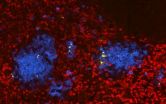(Press-News.org) Female politicians' success can be predicted by their facial features, especially in conservative states where women with more feminine faces tend to do better at the ballot box, a Dartmouth College-led study finds.
The results don't mean a supermodel will win the White House, but they do suggest women's electoral success requires a delicate balance between voters' perception of traditional femininity and political competence. The study appears in the journal Social Psychological and Personality Science. A PDF of the study is available on request. Here is a video animation of the experiment. The study included researchers from UCLA and the University of Delaware.
The researchers used software called MouseTracker that was developed by the study's senior author Jon Freeman, an assistant professor and director of the Social Cognitive & Neural Sciences Lab at Dartmouth. MouseTracker measures computer mouse movements during psychological experiments, revealing how participants' real-time hand movements may be partially pulled toward various alternatives and how their psychological response evolves over time. More than 1,000 scientists around the world are using the software for many purposes, such as detecting cognitive impairments and subtle racial biases, assessing marketing decisions and financial behavior and predicting health outcomes and social inequities.
Previous research has shown that faces with subtle atypical gender cues – women with masculine features and men with feminine features – cause initial uncertainty when people try to categorize them as male or female. Earlier studies also have linked perceptions of competence in male politicians' faces to political success. But the Dartmouth-led study demonstrates for the first time that gendered cues uniquely predict female politicians' electoral success above and beyond competence, suggesting a discrepancy between traits used to evaluate male and female politicians.
"Individuals are highly sensitive to gendered facial cues, and these cues are processed within only milliseconds after seeing another's face," Freeman says. "It's important to examine how facial cues could inadvertently affect female politicians' electoral success, especially given the possibility of a female U.S. president in the near future and the rising number of women in Congress."
The Dartmouth researchers wondered whether the initial confusion over how people perceive the biological and social gendered cues in politicians' faces – such as shape of eyes, cheekbones, jawlines and brows, length of hair, makeup – may influence conservative and liberal voting behavior and election outcomes.
The researchers tracked the computer mouse movements of nearly 300 participants who were shown politicians' faces – the winners and runners-up in U.S. Senate and gubernatorial elections between 1998 and 2010 -- and asked to categorize them as male or female. About 10 percent of the participants were Dartmouth students who viewed the politicians' faces in a controlled lab setting and were asked whether they would vote for them, although no information was provided about the politicians' background, competence or other factors. The other 90 percent of participants lived across the United States and took the facial test over the Internet, providing a diverse national sample.
The results showed that the more participants were drawn to select the male response when categorizing the gender of a female politician's face, the less likely she was to win her election. The lab participants also indicated they would be less likely to vote for such politicians. In other words, female politicians with more feminine features tend to win elections, while those with more masculine features tend to lose. The mouse-tracking technique further revealed that whether a female politician was going to win or lose an election could be predicted within just 380 milliseconds after participants were exposed to her face.
"We show that subtle uncertainty during the initial processing of a face's gender predicts the electoral success or failure of female politicians, and this is a unique effect not explained by perceived competence or attractiveness," says Freeman. "A female politician's success was related to how feminine or masculine her face was perceived less than one half-second after its initial exposure, suggesting that the way a face's gender is rapidly processed may translate into real-world political outcomes."
Importantly, the effects became more pronounced as the conservatism of the constituency increased, which supports previous research indicating that conservatives may be less tolerant of uncertainty. "This is thought to reflect a relatively rigid cognitive style and an emphasis on traditional gender roles," says lead author Eric Hehman, a postdoctoral researcher in Freeman's lab. "In contrast, previous research suggests liberals tend to exhibit greater tolerance of ambiguity and cognitive flexibility."
To quantify each state's conservative to liberal distribution, researchers looked at the margins of victory in each state from the five presidential elections between 1992 and 2008. Differences between conservatives and liberals' tolerance for uncertainty and traditional gender roles may create a volatile situation for female politicians.
"Because masculinity is stereotypically associated with leadership in the U.S., conservatives' preference for traditional gender roles and low tolerance for uncertainty may require women's leadership aspirations to be tempered by strong associations with femininity, particularly in their appearance," Hehman says.
INFORMATION:
Available to comment are Professor Jon Freeman at jon.freeman@dartmouth.edu and Eric Hehman at eric.hehman@dartmouth.edu
Broadcast studios: Dartmouth has TV and radio studios available for interviews. For more information, visit: http://www.dartmouth.edu/~opa/radio-tv-studios/
Not just a pretty face, although that helps female politicians on election day
Dartmouth-led study highlights voters' perception of traditional femininity, political competence
2014-05-15
ELSE PRESS RELEASES FROM THIS DATE:
Stem cell therapy shows promise for MS in mouse model
2014-05-15
LA JOLLA, CA—May 15, 2014—Mice crippled by an autoimmune disease similar to multiple sclerosis (MS) regained the ability to walk and run after a team of researchers led by scientists at The Scripps Research Institute (TSRI), University of Utah and University of California (UC), Irvine implanted human stem cells into their injured spinal cords.
Remarkably, the mice recovered even after their bodies rejected the human stem cells. "When we implanted the human cells into mice that were paralyzed, they got up and started walking a couple of weeks later, and they completely ...
Genetic tracking identifies cancer stem cells in human patients
2014-05-15
The gene mutations driving cancer have been tracked for the first time in patients back to a distinct set of cells at the root of cancer – cancer stem cells.
The international research team, led by scientists at the University of Oxford and the Karolinska Institutet in Sweden, studied a group of patients with myelodysplastic syndromes – a malignant blood condition which frequently develops into acute myeloid leukaemia.
The researchers say their findings, reported in the journal Cancer Cell, offer conclusive evidence for the existence of cancer stem cells.
The concept ...
Combination therapy a potential strategy for treating Niemann Pick disease
2014-05-15
CAMBRIDGE, Mass. (May 15, 2014) – By studying nerve and liver cells grown from patient-derived induced pluripotent stem cells (iPSCs), Whitehead Institute researchers have identified a potential dual-pronged approach to treating Niemann-Pick type C (NPC) disease, a rare but devastating genetic disorder.
According to the National Institutes of Health (NIH), approximately 1 in 150,000 children born are afflicted with NPC, the most common variant of Niemann-Pick. Children with NPC experience abnormal accumulation of cholesterol in their liver and nerve cells, leading to ...
'Bystander' chronic infections thwart development of immune cell memory
2014-05-15
PHILADELPHIA – Studies of vaccine programs in the developing world have revealed that individuals with chronic infections such as malaria and hepatitis tend to be less likely to develop the fullest possible immunity benefits from vaccines for unrelated illnesses. The underlying mechanisms for that impairment, however, are unclear, and distinguishing these so-called "bystander" effects on priming the immune system to fight future assaults versus development of immunological memory has been challenging.
A team from the Perelman School of Medicine at the University of Pennsylvania ...
E-cigarette awareness goes up, as (apparently) so does skepticism
2014-05-15
PHILADELPHIA (May 15, 2014) – Americans are unquestionably more aware of e-cigarettes, those vapor-emitting alternatives to tobacco cigarettes, according to a national survey. Yet, at the same time, the belief that e-cigarettes are safer than traditional smokes may be starting to diminish.
A national survey of 3,630 adults found that 77 percent of the respondents have heard of e-cigarettes; that's way up from 16 percent just five years ago. But the perception that e-cigarettes are actually less harmful than tobacco cigarettes among current smokers decreased slightly, ...
Protein sharpens salmonella needle for attack
2014-05-15
A tiny nanoscale syringe is Salmonella's weapon. Using this, the pathogen injects its molecular agents into the host cells and manipulates them to its own advantage. A team of scientists at the Biozentrum of the University of Basel demonstrate in their current publication in Cell Reports that a much investigated protein, which plays a role in Salmonella metabolism, is required to activate these needles and makes the replication and spread of Salmonella throughout the whole body possible.
The summer months are the prime time for Salmonella infections. Such an infection ...
The color of blood: Pigment helps stage symbiosis in squid
2014-05-15
MADISON, Wis. – The small but charismatic Hawaiian bobtail squid is known for its predator-fooling light organ.
To survive, the nocturnal cephalopod depends on a symbiotic association with a luminescent bacterium that gives it the ability to mimic moonlight on the surface of the ocean and, in the fashion of a Klingon cloaking device, deceive barracuda and other fish that would happily make a meal of the small creature.
The relationship between the squid and the bacterium Vibrio fischeri is well chronicled, but writing in the current issue of the journal Proceedings ...
Synthetic biology still in uncharted waters of public opinion
2014-05-15
The Synthetic Biology Project at the Woodrow Wilson International Center for Scholars is releasing the results of a new set of focus groups, which find continued low awareness of synthetic biology among the general public.
The focus groups also sought opinions on the emerging field of neural engineering.
The focus group results support the findings of a quantitative national poll conducted by Hart Research Associates in January 2013, which found just 23 percent of respondents reported they had heard a lot (6 percent) or some (17 percent) about synthetic biology.
The ...
Added benefit of the fixed combination of dapagliflozin and metformin is not proven
2014-05-15
The fixed combination of the drugs dapagliflozin and metformin (trade name: Xigduo) has been approved since January 2014 for adults with type 2 diabetes in whom diet and exercise do not provide adequate glycaemic control. In an early benefit assessment pursuant to the Act on the Reform of the Market for Medicinal Products (AMNOG), the German Institute for Quality and Efficiency in Health Care (IQWiG) now examined whether this new drug combination offers an added benefit over the appropriate comparator therapy. No such added benefit can be derived from the dossier, however, ...
Mothers' symptoms of depression predict how they respond to child behavior
2014-05-15
Depressive symptoms seem to focus mothers' responses on minimizing their own distress, which may come at the expense of focusing on the impact their responses have on their children, according to research published in Psychological Science, a journal of the Association for Psychological Science.
Depressive symptoms are common among mothers, and these symptoms are linked with worse developmental outcomes for children. The new study, which followed 319 mothers and their children over a two-year period, helps to explain why parenting competence seems to deteriorate as parents' ...
LAST 30 PRESS RELEASES:
Scientists discover why we know when to stop scratching an itch
A hidden reason inner ear cells die – and what it means for preventing hearing loss
Researchers discover how tuberculosis bacteria use a “stealth” mechanism to evade the immune system
New microscopy technique lets scientists see cells in unprecedented detail and color
Sometimes less is more: Scientists rethink how to pack medicine into tiny delivery capsules
Scientists build low-cost microscope to study living cells in zero gravity
The Biophysical Journal names Denis V. Titov the 2025 Paper of the Year-Early Career Investigator awardee
Scientists show how your body senses cold—and why menthol feels cool
Scientists deliver new molecule for getting DNA into cells
Study reveals insights about brain regions linked to OCD, informing potential treatments
Does ocean saltiness influence El Niño?
2026 Young Investigators: ONR celebrates new talent tackling warfighter challenges
Genetics help explain who gets the ‘telltale tingle’ from music, art and literature
Many Americans misunderstand medical aid in dying laws
Researchers publish landmark infectious disease study in ‘Science’
New NSF award supports innovative role-playing game approach to strengthening research security in academia
Kumar named to ACMA Emerging Leaders Program for 2026
AI language models could transform aquatic environmental risk assessment
New isotope tools reveal hidden pathways reshaping the global nitrogen cycle
Study reveals how antibiotic structure controls removal from water using biochar
Why chronic pain lasts longer in women: Immune cells offer clues
Toxic exposure creates epigenetic disease risk over 20 generations
More time spent on social media linked to steroid use intentions among boys and men
New study suggests a “kick it while it’s down” approach to cancer treatment could improve cure rates
Milken Institute, Ann Theodore Foundation launch new grant to support clinical trial for potential sarcoidosis treatment
New strategies boost effectiveness of CAR-NK therapy against cancer
Study: Adolescent cannabis use linked to doubling risk of psychotic and bipolar disorders
Invisible harms: drug-related deaths spike after hurricanes and tropical storms
Adolescent cannabis use and risk of psychotic, bipolar, depressive, and anxiety disorders
Anxiety, depression, and care barriers in adults with intellectual and developmental disabilities
[Press-News.org] Not just a pretty face, although that helps female politicians on election dayDartmouth-led study highlights voters' perception of traditional femininity, political competence


